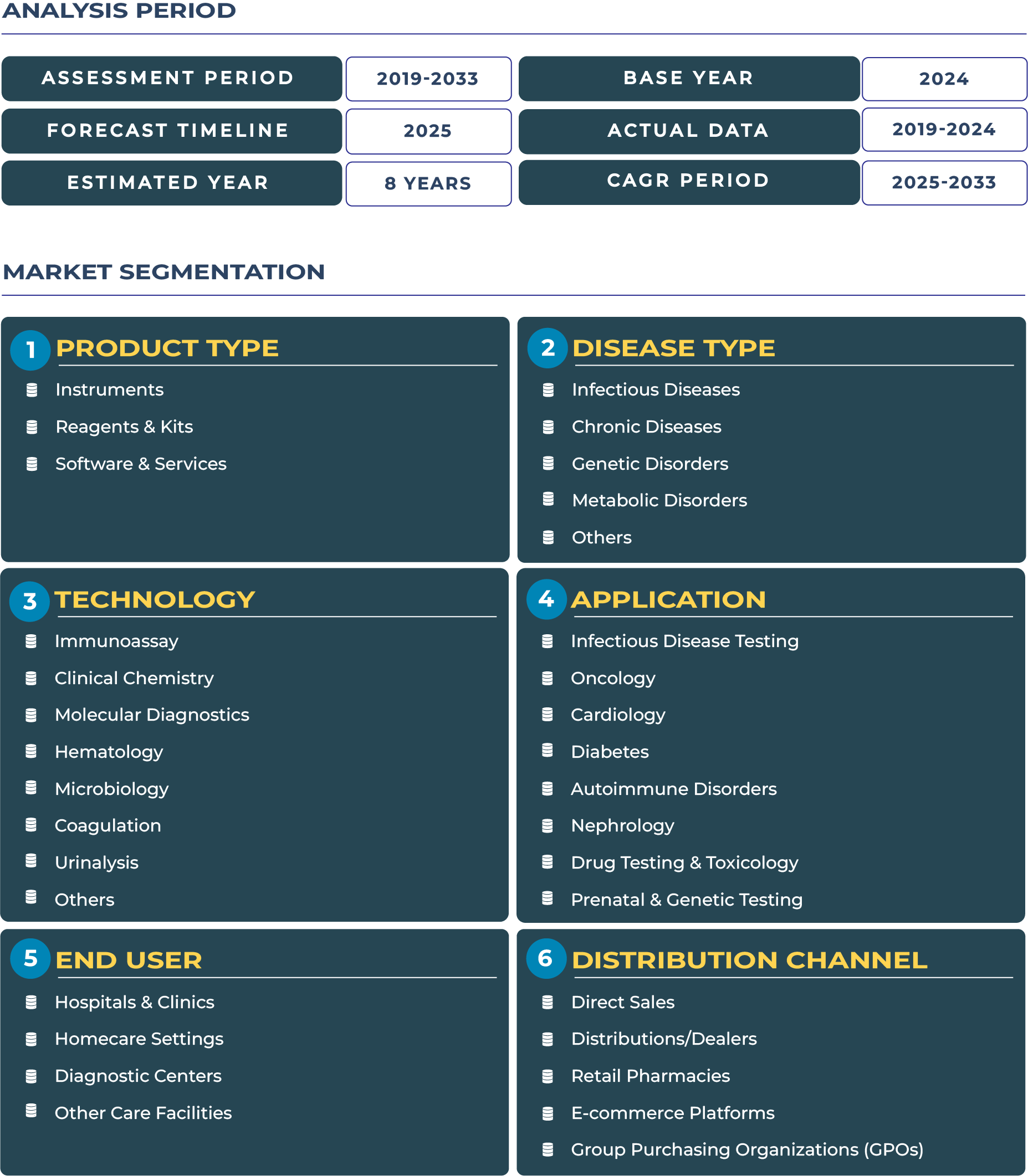Western Europe In-vitro Diagnostic Market Outlook: A Mature Yet Innovation-Driven Ecosystem Transforming Clinical Outcomes
The Western Europe in-vitro diagnostic (IVD) market stands at the intersection of maturity and innovation. Anchored by advanced healthcare systems, high clinical awareness, and strong government involvement, the region continues to redefine diagnostic precision and patient outcomes through digital transformation, automation, and personalized medicine. In 2025, the market is valued at USD 22.08 billion and is projected to reach USD 32.02 billion by 2033. This growth trajectory reflects Western Europe’s inclination toward advanced device innovations, robust laboratory infrastructure, and the aging population’s rising need for early disease detection and monitoring.
Transforming Diagnostics Through Technological Precision and Data-driven Insights
The Western European IVD industry has evolved into a mature yet innovation-oriented landscape, where technological precision meets evidence-based medicine. The region’s established economies, such as Germany, France, and the UK, are prioritizing automation, robotics-assisted diagnostics, and advanced reagent platforms to enhance testing accuracy and reduce turnaround times. With the growing prevalence of chronic diseases, laboratories are increasingly adopting real-time PCR systems, immunoassay analyzers, and next-generation sequencing tools that allow for higher diagnostic throughput and sensitivity.
Healthcare providers are integrating AI-enabled analytics and laboratory information management systems to link patient diagnostics to therapeutic decision-making, a move strongly supported by the European Commission’s Directorate-General for Health and Food Safety. The demand for reagents and kits continues to dominate the market, driven by rapid point-of-care testing in hospitals and ambulatory settings. Despite geopolitical uncertainties and fluctuating energy costs across the EU, the diagnostic industry remains resilient due to its essential role in early detection and pandemic preparedness.
Drivers & Restraints: Evaluating the Dynamics Shaping Western Europe’s Diagnostic Evolution
High Hospital Density and Robust Clinical Registry Integration Bolstering Market Growth
One of the core strengths of the Western Europe IVD sector is its dense hospital network and the seamless integration of clinical registries. With countries like Germany and France maintaining some of the world’s most comprehensive clinical data registries, diagnostic vendors can align testing solutions to evidence-based outcomes. Hospitals across the UK and Nordics are accelerating adoption of molecular diagnostics for cancer, infectious diseases, and genetic testing, creating a fertile ground for reagent innovation. Furthermore, public-private partnerships, such as the UK National Health Service collaborations, continue to drive deployment of automated laboratory systems and digital diagnostics across urban centers.
Procurement Centralization and Price Erosion Challenge Profitability
Despite this promising outlook, the Western European IVD ecosystem faces certain economic and operational challenges. Centralized procurement frameworks in countries like Italy and Spain have intensified price-based competition, squeezing margins for manufacturers and service providers. Moreover, compliance with regulatory frameworks, such as the EU In-vitro Diagnostic Regulation (IVDR), has increased compliance costs for many firms. These stringent requirements, while improving patient safety and quality, have delayed product launches and raised entry barriers for smaller diagnostic developers.
Trends & Opportunities: Registry-led Innovations and Robotics-Enhanced Diagnostics Redefining Competitive Advantage
Registry-driven Procurement and the Rise of Ambulatory Diagnostic Hubs
Western Europe is witnessing a strong transition toward registry-driven procurement and data-led performance evaluation. Health systems in the Nordics and Benelux have implemented registry-linked tender frameworks that prioritize proven clinical effectiveness over pricing alone. The trend toward ambulatory testing, particularly in major cities like London, Paris, and Munich, is reshaping how patients access diagnostics. Laboratories are integrating robotics to automate high-volume sample processing, while hospital chains are expanding decentralized testing centers for faster turnaround in non-critical diagnostics.
Robotics and Premium Diagnostic Platforms Unlocking New Market Opportunities
Manufacturers are leveraging robotics as a differentiator in clinical performance, offering service bundles that combine device, software, and after-sales analytics. Companies like Roche Diagnostics are leading this transformation through advanced molecular testing systems and cloud-connected instruments. The shift toward personalized medicine and early detection also opens opportunities for premium reagent kits and predictive software platforms. With the European Commission emphasizing cross-border digital health initiatives, the Western European IVD market is poised for robust innovation across automation, bioinformatics, and integrated care diagnostics.
Regional Analysis by Country
United Kingdom
The UK IVD market is characterized by its strong NHS-led framework emphasizing centralized procurement and evidence-based technology adoption. Increased focus on chronic disease testing and genomics supports reagent demand growth.
Germany
Germany leads the regional landscape with advanced laboratory automation and robotics adoption. Public and private healthcare systems are jointly investing in AI-enabled diagnostic systems to streamline clinical workflows.
France
France IVD ecosystem emphasizes innovation-driven diagnostics with high adoption of immunoassays and molecular testing platforms, particularly in oncology and infectious disease diagnostics.
Italy
Italy IVD market is evolving through public health modernization and adoption of rapid testing in urban healthcare centers. Price control and procurement reforms remain key policy challenges.
Spain
Spain is expanding its laboratory networks through decentralized testing systems and private-sector collaborations. Point-of-care diagnostic solutions are growing due to increased outpatient testing.
Benelux
Benelux countries are pioneers in registry-based diagnostics, emphasizing transparency and clinical outcome validation. Integration of digital tools in hospital systems is driving reagent and software demand.
Nordics
Nordic countries are adopting sustainable diagnostic practices with AI-assisted laboratories and minimal reagent waste. High investment in public health research fuels market innovation.
Competitive Landscape: Strategic Collaborations and Service-Device Integration Redefining Market Leadership
The competitive landscape of Western Europe’s IVD sector is defined by multinational and local firms leveraging data-driven evidence, automation, and strategic procurement alignment. Leading players such as Roche Diagnostics, Siemens Healthineers, and Abbott Laboratories continue to strengthen their foothold through innovation-driven partnerships and digital workflow integration. In 2024, several companies announced initiatives to enhance service bundles combining instruments, reagents, and analytics dashboards for hospitals. Registry-backed evidence has become a decisive factor in winning tenders, encouraging vendors to invest in real-world data collection and performance validation. This approach not only enhances transparency but also supports sustainable growth amid evolving regulatory pressures.








